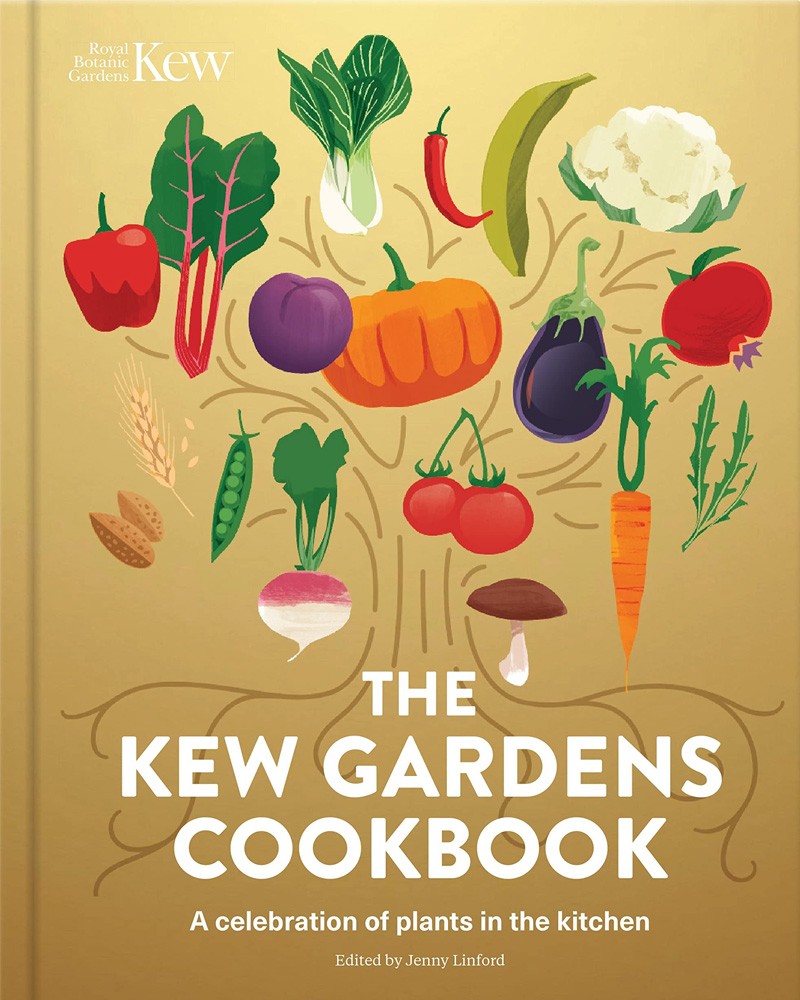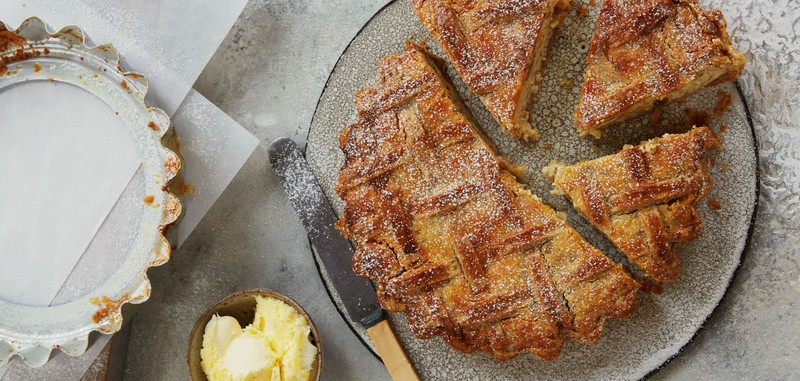
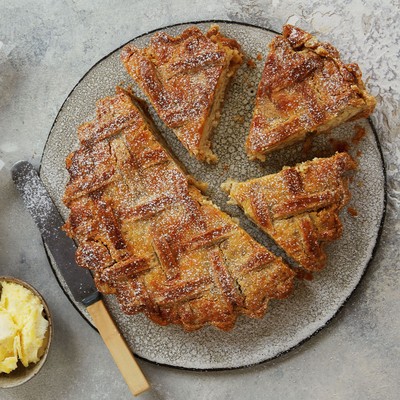
3 Summer Recipes To Try From Kew Gardens
The kitchen is where we connect with plants in a very special way – from that first cup of tea or coffee and slice of toast or bowl of muesli or porridge we start our day with, to the bowl of spaghetti with tomato sauce or stir-fried vegetables with rice we eat for supper. They literally sustain us. This vegetarian cookbook celebrates both the glorious variety of edible plants and fungi that we eat and the vital work that the Royal Botanic Gardens, Kew do to promote and sustain the rich biodiversity of the plant and fungi world.
We increasingly understand how important eating plants is for our health. Plants are rich in antioxidants, which our bodies need to maintain good health, and are an important source of both vitamins and fibre. Importantly, there is also the health of the planet to consider. In a time of climate change and population growth, the quest for a sustainable diet is a crucial one. It is widely agreed that in order to slow climate warming, one important thing we can all do as individuals is reduce our meat consumption and eat more plants.
Climate change and its impact on the plants we depend on to sustain life is an issue which Kew takes very seriously. Central to Kew’s work is a fight against biodiversity loss. One important strand of this is preserving genetic diversity. Two in five plant species are in danger of extinction. Kew’s Millennium Seed Bank at Wakehurst, Kew’s wild botanic garden in Sussex, stores over 2.4 billion seeds from around the world to conserve them for the future. Among these saved seeds are the wild cousins of our food crops. Over time, through selective breeding, many commercially grown crops have lost genetic diversity and resilience. The hope is that the conserved crop wild relatives have characteristics that could be useful in developing new varieties that are more resilient to climate change.
The theme of coming together is important. Sharing food is a special way of connecting with others; it is at the heart of hospitality. Taking the time and trouble to cook for others is nourishing in so many ways. In our hectic world, the time spent together over meals – with the chance to talk and share our thoughts and feelings – is precious. If changing how we eat can help our beautiful, precious planet, then surely we need to embrace that.
Inspired? Here are three recipes to try at home…
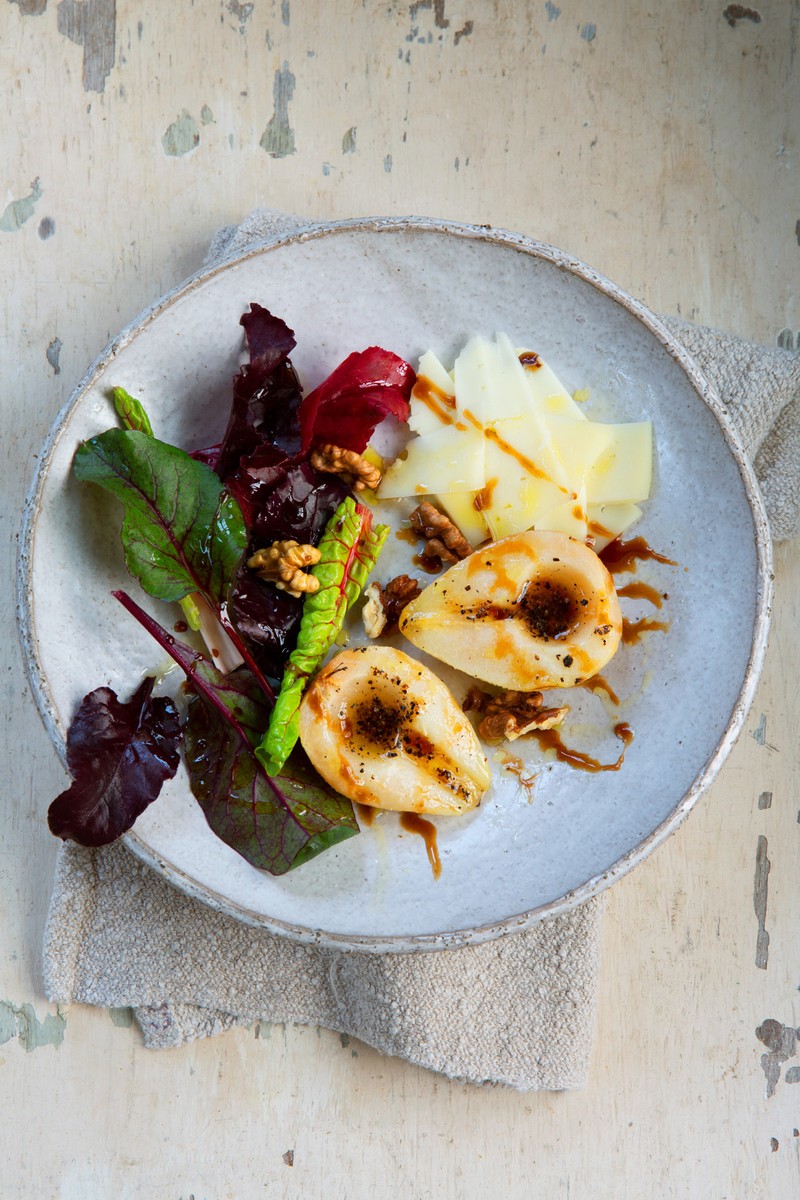
Roasted Peppered Pear Salad With Sheep’s Cheese, Honey & Walnuts: Christine McFadden
This is a simple but impressive starter that relies on top-quality ingredients. Peppercorns are particularly important – unnamed varieties will add little to the dish whereas Wynad or Tellicherry from Kerala, in southwest India, are the Rolls Royce of peppercorns. Both have complex rich flavours and warm but not biting heat. You’ll find them online and in good supermarkets.
Preheat the oven to 200°C/180°C Fan. Slice the pears in half lengthways and remove the cores, interior stem and peel. Place cut side up in a small roasting tin.
Combine the sea salt flakes and peppercorns, and lightly crush using a pestle and mortar. Sprinkle the mixture into the cavities of the pears, then spoon the honey over the top. Drizzle with the olive oil and lemon juice. Pour the water into the base of the roasting tin.
Roast for 20-30 minutes, turning the tin halfway through, until the pears are beginning to brown at the edges. Carefully move them to a plate, pour over the juices from the roasting tin and leave to cool slightly.
Divide the chard or beet leaves between four serving plates. Place a warm pear half on top with a few slices of sheep’s cheese to one side. Scatter the walnut halves over the pears and leaves. Sprinkle with more honey, a few drops of extra virgin olive oil, some crumbled sea salt flakes and a dribble of sticky aged balsamic vinegar.
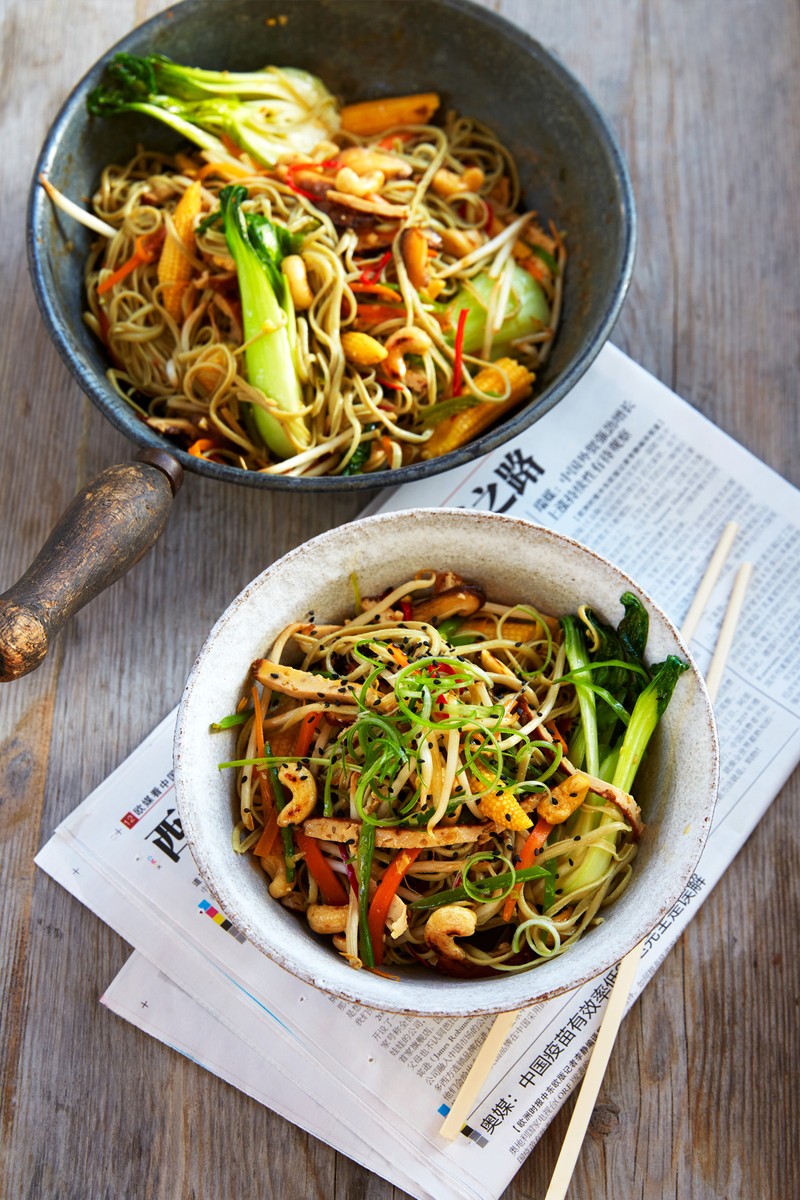
Buddha’s Veggie Chow Mein: Ching-He Huang
This is the kind of dish that allows you to use up any leftover vegetables and is so easy using store cupboard ingredients. I love adding some slices of smoked tofu for texture and protein. Of course, use whichever noodles you like but I love organic soybean noodles which are high in protein, are gluten free and high in fibre. They have a slight beany flavour too. This dish is not only packed with more than your five-a-day veggies, it’s aromatic and delicious. It’s perfect as a mid-week supper or a feasting dish for family and friends.
Combine all the ingredients for the sauce, mix well and place in a jug. Cook the organic soybean noodles in boiling water for 3 minutes. Drain and refresh the noodles in cold water. Dress with 1 tsp of toasted sesame oil, mix well and set aside.
Prepare all the rest of the ingredients.
Heat a wok over high heat and add the rapeseed oil. Add the garlic, ginger, chilli and stir-fry for a few seconds, add the carrot and stir-fry for one minute, add the shiitake, mangetout, baby corn and pak choy leaves and toss, cooking for a few seconds. Add in the rice wine. Stir gently for 1 minute. Add the smoked tofu slices.
Pour in the sauce and bring to the bubble, cooking for less than a minute until the sauce is shiny. Toss the noodles and gently fold them in, mixing the noodles with the ingredients and sauce together in the wok, but being careful not to ‘stab’ at the noodles or ingredients. Season with 1 tbsp of tamari.
Finally sprinkle in the beansprouts and give it one last stir together. Spoon out and sprinkle over spring onion curls, toasted cashew nuts and black sesame seeds. Place on the table and serve with other dishes or spoon into individual serving plates. Serve with Chiu Chow chilli oil on the side.
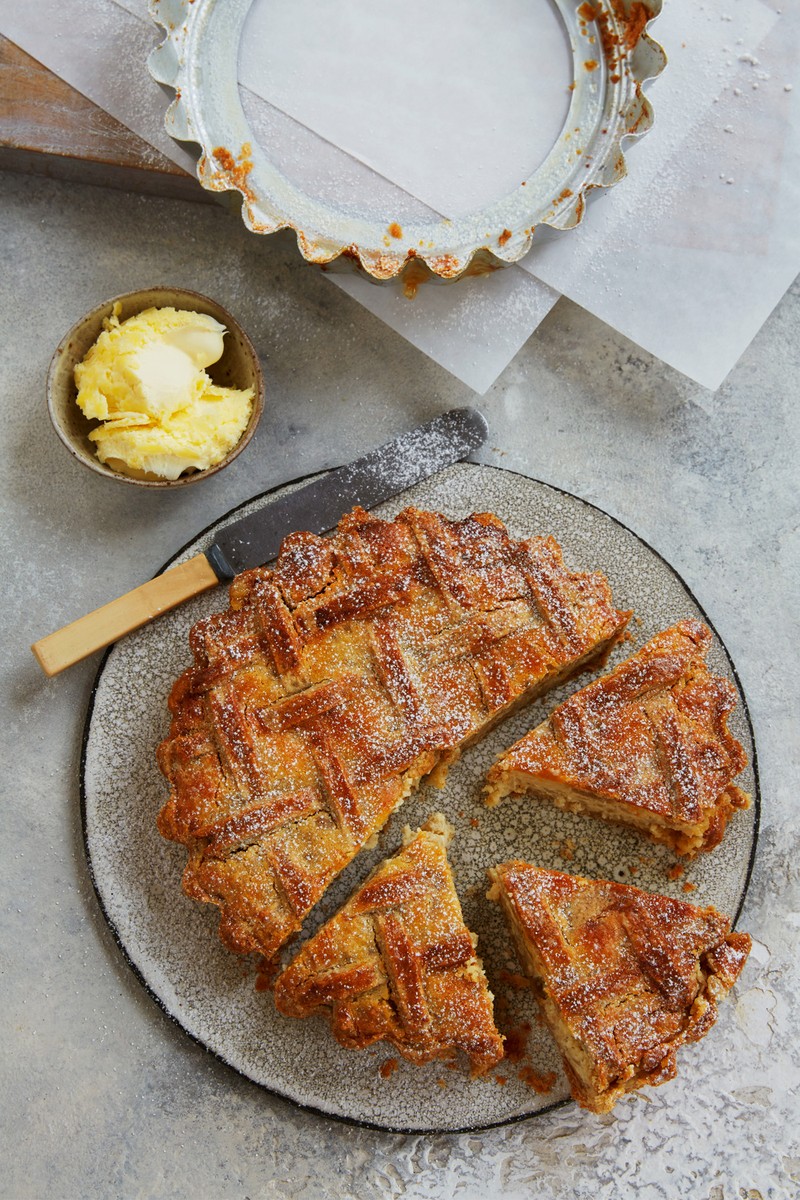
Marmalade Wholegrain Tart: Dan Lepard
This is a tart that celebrates the beautiful texture of wholegrains, merging the delicious Easter pastiera of Naples with Britain’s Bakewell pudding and maids of honour, holding a filling that combines cooked barley, sweet fresh cheese and almonds with a layer of your very best marmalade. The maslin reference in the shortcrust here refers to an old English name for a flour mix that was made from rejected grains like rye, spelt, oats, once considered too unsophisticated for the grandest baking. Well, for me they give it grandeur, and the flavour they add to this all-butter shortcrust makes it ever so good to eat. Best made the day before so the marmalade has time to re-set and firm.
For the maslin shortcrust, put the flours, salt and sugar in a bowl. Rub in the butter with your fingers, then add the egg and mix well to a smooth and very soft paste. In truth it will seem unmanageably soft and paste-like but don’t worry. Scoop it onto a piece of baking parchment or cling film, press it into a block about 2cm thick and chill in the fridge for an hour.
For the filling, put the pearl barley in a saucepan, cover with water, bring to the boil then simmer briskly for about 20 minutes until soft with still a touch of chew to it. Drain into a sieve, rinse with cold water, then drain again.
Place the cream cheese, curd cheese, ground almonds, sugar, vanilla, orange zest, whisky and egg (reserving a few teaspoons for brushing) in a bowl and beat everything together smoothly. Add the well-drained cooked barley and stir well.
Roll the pastry thinly and line the base and sides of a round fluted 18cm loose-base tart tin or similar. Spread the marmalade evenly over the base then spread the cheese and grain filling over that. Using leftover pastry, roll and cut strips to decorate the top in a lattice pattern, then brush the strips with the remaining beaten egg to make them shine.
Heat the oven to 190ºC/170ºC Fan and bake for about 50 minutes until the top is gently golden and the marmalade starts to bubble up around the edges.
Remove from the oven and leave until very cold or, better still, the next day. Perfect dusted with a little icing sugar and served with a scoop of clotted cream.
The Kew Gardens Cookbook – A Celebration of Plants in the Kitchen edited by Jenny Linford (Kew Publishing, £20) is available to pre-order here.
DISCLAIMER: We endeavour to always credit the correct original source of every image we use. If you think a credit may be incorrect, please contact us at info@sheerluxe.com.
